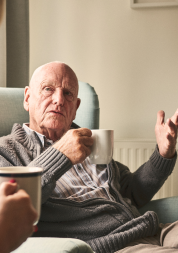Report: The strain of unpaid caring

What people told us about the emotional impact of caring
- 82% of carers reported feeling overwhelmed because of their caring role.
- 58% of carers said they experienced low moods because of their caring role.
- 85% of carers felt stressed because of their caring role.
- 71% of carers said they felt anxious because of their caring role.
Download our full report below.
Downloads
It impacts me in every way. I mostly feel overwhelmed, sad, and lonely.
Carers also told us that they often had to be very aware of the person they were caring for in order to protect them.
This constant need to be aware of what is going on or if the person is safe means that carers experience a lot of worry and anxiety.
Many carers said they experienced physical impacts because of caring. These included a fatigue, an impact on their blood pressure, stomach issues, flare ups of existing chronic conditions, joint pain/arthritis, and a heart attack.
We also heard about:
- co-dependency issues
- carers struggling to care for themselves
- feeling a lack of control over their own lives
- social isolation
- the financial impact on unpaid caring
Our recommendations
- Physical health and wellbeing: encourage GP surgeries to screen for stress-related injuries and promote training on safe physical care techniques.
- Support for wider family: increase support and awareness for family of people being cared for.
- Recognise the unique challenges faced by ‘sandwich carers’: increase the visibility and awareness of the challenges faced by sandwich carers to help distinguish their needs and issues from other carers.
- Carer isolation: recognise and acknowledge the significance of loneliness in the carer experience and try to reduce this feeling among carers through support and planning.
- Financial support: improve the visibility and accessibility of financial support information through local authorities and carer organisations.
- Recognition: increase formal recognition of carers by GP surgeries and local authorities to validate their role and contribution.
- Mental and emotional support: develop targeted emotional support interventions, including more male focused support groups that use activity-based engagement.
Share your experience of being a carer with us. Click the pink 'talk to us' button below and complete our online feedback form.

